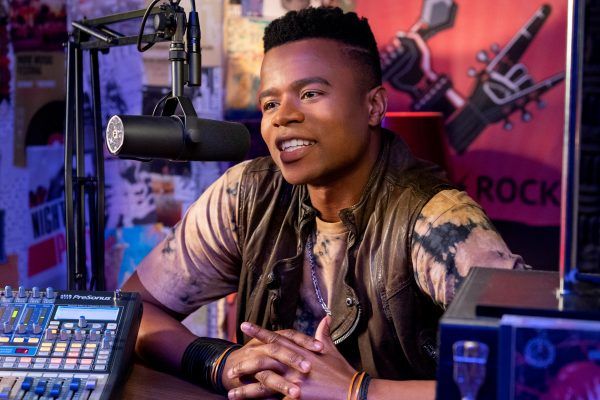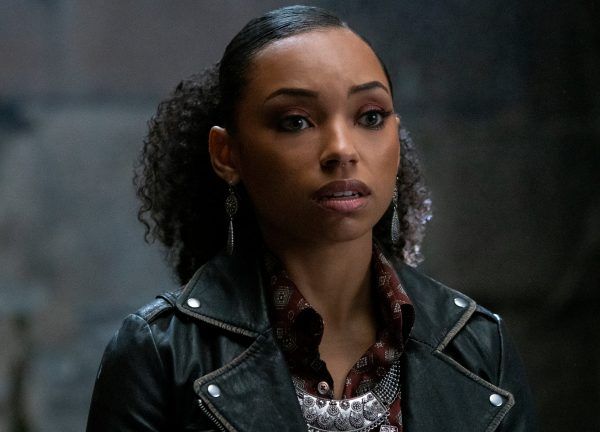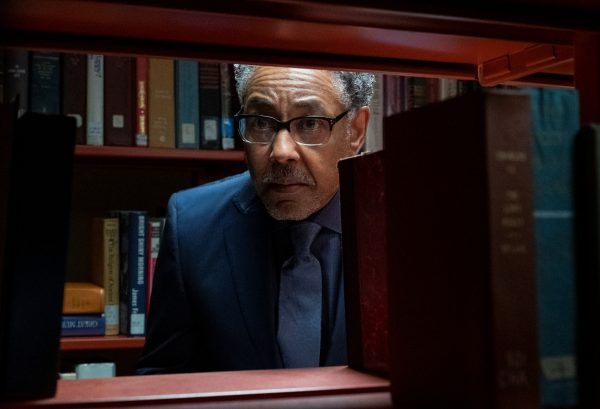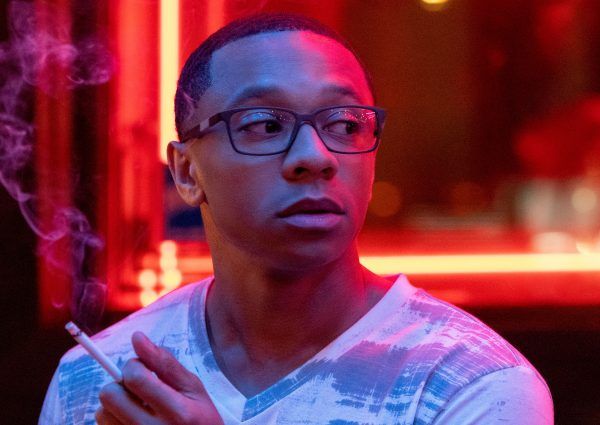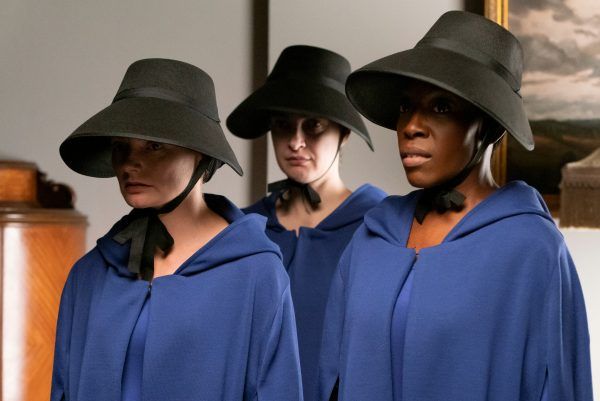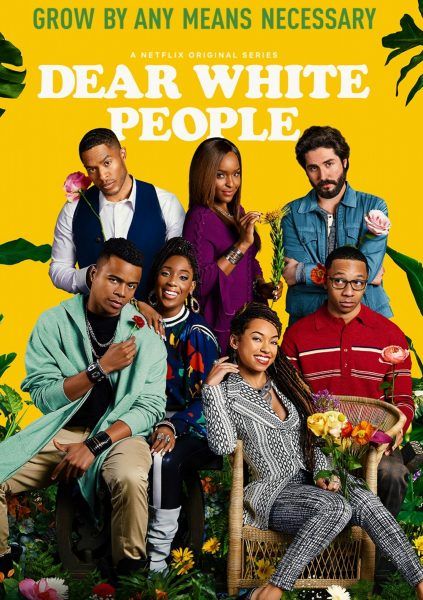*Be aware there are spoilers discussed for the entirety of Dear White People Season 3*
In Vol. 3 of the Netflix original series Dear White People, from show creator / writer / director / executive producer Justin Simien (who also wrote and directed the original film), the students at Winchester University are still on their journeys of self-discovery, as they try to figure out their place in the world and what they want for themselves. While the story is still biting and witty in its social commentary, and contains some of the great pop culture references its become known for, it’s also expanding with more overlapping stories among its strong ensemble of characters and actors.
During this 1-on-1 phone interview with Collider, Justin Simien talked about feeling positive that Season 4 of the series will happen and having a firm plan in place for it, being able to get a bit of the viewing information from Netflix even though it’s still not publicly released, changing up the storytelling format in the third season, how the structure of Dear White People is like jazz, the pop culture jokes and references, the characters he was excited to dig deeper into, having Giancarlo Esposito (who previously provided the voice for the Narrator) join the series in the flesh, working with this remarkably talented cast, and doing a bit of acting in the season, himself. He also talked about his horror comedy Bad Hair and the effort to get it out to audiences, his desire to do a musical, and what he’s looking to do next.
Collider: Every time I talk to you, it feels like I’m still waiting to hear whether or not the show will be returning for another season. Are you feeling positive about a Season 4 for Dear White People?
JUSTIN SIMIEN: Yeah, I’m feeling very positive about it. I have not gotten an official date, but I am feeling good about it.
Do you already have ideas for Season 4? Do you have a pretty firm plan for what you’d like to do?
SIMIEN: Yes, I do. It always happens that I have an inkling of what I want to do, as I’m finishing a season. There’s something about it airing and feeling some of the response – you can’t really feel all of the response from Netflix – and it just dawns on me what to do next. The same thing has happened again, and I’m extremely excited about it. I hope I get a chance to talk to you about it in a year, or less than that, actually. So, yeah, I definitely have a way that I want to approach the next season.
Even though Netflix has been pretty tightlipped about viewership and demographics, you’ve said previously that you do know a bit about who is viewing the show, and that this show is also one of the most watched black ensemble shows out there. Has there always been a line of communication with Netflix, as a creator, or have they opened up more, as the seasons have gone on?
SIMIEN: They’ve opened up more. The tricky thing is that I still can’t really talk about it. They’re pretty strict about that. I’ll just say that, as an artist who hopes to reach a lot of people, I feel very satisfied by what I do know about our audience and our numbers. It’s funny because I do feel like we’re sometimes thought of as a niche show, but people really watch the show and they’re really responding to it, and that’s cool to know. Even if it’s not really a public thing that you can celebrate publicly, in my quiet time, it’s nice to know and that people are tuning in and paying attention to what I’m doing.
Had you always had a goal that Season 3 would be the point where you’d change things up, mix it up, and change the storytelling format? Was that something you had thought about doing in this season, specifically, or is that just where things lead?
SIMIEN: It was a number of things. I was changing, as an artist. This last year was really tough. It was probably the toughest year of my life, so far, professionally speaking, because I was making my next film, at the same time as the third season. I felt like I had to do it while I was young. So, some of the change was about needing to open the show up, process wise. I knew that I would need to really rely on collaborators this time, particularly directorial collaborators. I always think of the show like jazz. I’m constantly setting a melody for people to play with, and to harmonize off of, and to riff off of. And I feel like our audience is so diverse and they just love these characters, and I wanted to give them more of all of the characters that they love. The movie was supposed to be more like the show, with many, many, many, many, many characters, but I didn’t know if I had the skill to pull that off and I definitely did not have the money. So, in the show I’m getting to exercise that, a little bit more.
This season, we set a melody, but then we really go off the rails. One of the anxieties that I feel is, with all of these different movements that are happening, whether it’s #MeToo or Black Lives Matter, or whatever, how are we all gonna come together to be a part of the greater good. We all kind of agree with each other, but we have different banners and we’re waving different flags. This season was an attempt to show how that might harmonize into people really coming together to work together, to hear each other, and to process each other’s pain and information. That’s what I was trying to work out, this season. How do you make sense of living in the 21st century, which feels so exciting because there are so many new movements and so many liberated people, but it’s also very dissident and confusing, and it can be scary when we think about trying to harmonize and achieve things that we all really want, like stopping climate change, or having a president that makes sense, and ending racism and sexism. Most of us want those things, but we feel so separate. That’s what I was trying to articulate, this time around.
Because you were able to dig deeper and showcase many of the supporting characters this season, were there specific characters that you were most excited to get to learn more about, since you’d be giving them more screen time?
SIMIEN: Yeah, I was really excited about Brooke. I think Courtney Sauls, who plays Brooke, is a real gem, who has so much power and presence. Brooke was always a character that I wanted to feel more from. There’s a new character D’Unte, this season, who is named after a friend of mine from high school that has passed on, and was really my way of shining a light onto the queer community of Winchester. Lionel was so hesitant to join anything, or to put a stamp on himself, or to take a dive into the deep end of the gay pool. So, to have a conduit to explore that world, that I’ve always wanted to explore, as a gay man, and I’ve always wanted to bring the audience with Lionel and on that journey, but also just see what everyone else is up to besides Lionel, in the queer world of Winchester, and that was really cool to do with D’Unte. One of the things about the real D’Unte that I love the most was his way with words. He didn’t even realize how funny he was. He was just so witty, and he would say things that would make you erupt into laughter. I wanted to channel some of that and give people just a taste of who that person was, and that felt really special and meaningful.
How much fun was it, too, to also get to have Giancarlo Esposito around as more than just the narrator of the story?
SIMIEN: All of the guest stars this season were great, but Giancarlo is the man. He’s just as kind and nice as you want him to be. He’s a great actor, obviously. He’s one of the legendary actors of our time, but on top of that, he’s just a really humble, cool dude, who loves art and loves making things that are important. He was so wonderful to work with. And then, Yvette Nicole Brown is someone I’ve been obsessed with, since before I even made the movie. She was actually the first celebrity to send me a Dear White People tweet, and I got to tell her that at the premiere. It was so wild to have her on the show, and she’s so funny. That’s one episode that always makes me just laugh out loud, no matter how many times I’ve seen it. Her work is so good. Laverne Cox has become a dear friend, and I think she’s phenomenal. I even put her in another thing that I’m working on (the feature film Bad Hair), which was really great. They were all really terrific this season. I felt really blessed. The collaborators and the directors were so great. It was rally a beautiful ensemble, both in front of and behind the camera.
When I watch this show, I’m struck by how completely remarkable this cast is, and how there are not more people talking about them all, every day.
SIMIEN: I know. I think about that, all the time. I really do. I think that they’re one of the most talented casts in television, and each of them has so many great moments. Brandon Bell, to me, is such a leading man. Marque [Richardson] is such a leading man. I think John Patrick [Amedori] is so adorable and delightful. DeRon [Horton] is a freakin’ nut case and is nothing like Lionel. He’s a real mad genius. He’s got a Heath Ledger energy because he disappears into roles and yet he makes them feel completely his. He’s magic. Ashley Blaine Featherson is great. These actors are an embarrassment of riches. And of course, there’s Logan [Browning] and Antoinette [Robertson]. I think it’s just too much for people to know how to process, individually. Everybody is great. It’s hard for one person to really stand out because they’re all incredible.
You’re very hands on and very involved with the show, as the creator, and as a producer, writer and director on it. What was it that made you decide to play more than one character this season and how was it to work with Logan Browning, as a scene partner?
SIMIEN: It came out of my desire to let Tyler Perry, specifically, know that I appreciate his work. I felt like, if anybody else played Jerry Skyler and, subsequently, the character that he plays, it would be parody and it wouldn’t feel like art, and that’s not how I wanted it to come across. I wanted it to feel very heartfelt. And I got started, as an actor. I trained as an actor in the theater program in Texas, at the performing arts high school. That’s really where I grew and became who I am, as an artist, and I’ve never stopped loving it. On the page, it just felt right. I didn’t want it to come off like we were making fun of him, or that he was just this random character. I wanted it to feel personal. So, I was reading the part in the room, because we do these table reads while we’re writing, and the writers were like, “You should do this.” I felt it too, so that’s what we did. And when it came to working with Logan, I love actors and I love working with actors. Working with Logan, particularly last season when we did that bottle episode where everything was in the radio station, we got in there. We made that thing like a play, and it felt really natural. When you direct an actor like that and it’s a very personal relationship, to me, it’s not that big of a leap to join the scene. I think she had fun, too. She’s so brilliant and so great it really, it was fun. Kimberly Peirce, who’s a name director and who made Boys Don’t Cry, which is a classic, was directing, so I was free to play. I loved being directed. I loved being told where to be. I loved not having to worry about any of that, and just got to be in the scene and play with her. That was a real treat.
There are definitely a lot of pop culture jokes and references on Dear White People, and I loved the one this season that was made about take on The Handmaid’s Tale type of series and how its lead actress is in a cult. When you do things like that, do you ever worry that you’ll be standing at a party across from the people that you are poking fun at, and that they could approach you about it?
SIMIEN: I have to say that it’s not just me. I have writers, as well, and I did not write that particular joke. My philosophy on it is, was there a lie given? And did it say something that I think is worth talking about? If it does those things, than it has to go in the show. I’ve had to make peace with it. Not only have I been at parties a lot, but I’ve been at home with people who felt broadsided by a joke. There are relationships that I thought I would have with people that don’t exist because they were mentioned in the show, and sometimes in a favorable way. People just don’t necessarily want to be fandomed like that. But the truth is that’s what I came to do. The purpose of the show is to examine the things that we love, the things that we hate, and the things that make up our world, particularly as it pertains to race, identity, and self in American society. So, if I’m going to categorize popular culture, as it relates to those things, then I can’t really pull any punches. It’s just very awkward, actually, and I have not fully made peace with it because of some people’s feelings have been hurt. I didn’t really mean it that way, and I don’t think the audience took it that way, but for whatever reason, it came out in such a way that someone was horrified.
But part of my thing is that I throw darts. That’s part of what I’m here to do, as an artist. It’s the way that my brain works. The things that I love the most are the things that I parody the most, in my life. Even as a fan of The Handmaid’s Tale, this is a season where the kids are dealing with whether or not something that happened was sexual harassment or sexual assault, and what that might mean. In the middle of all of that, there’s this show that’s a pop culture phenomenon that brings up a lot of questions that no one seems to be answering. It’s a good target because I love that show. It’s a double-edged sword, but I’ve gotta do it. Otherwise, I don’t think I’m doing my job, as an artist who does satire. But, it’s very awkward. I also never make a joke about anybody that I wouldn’t make public. I parody the show, in the show. Coco says things like, “Oh, my god, if I hear one more articulate argument about racism!” I don’t know what our show is, if it’s not a series of articulate conversations about racism. The point of the show is to hold the status quo up to the vision, and to say that just because it’s comfortable, it doesn’t mean that we shouldn’t parody it. I’ve become the status quo, in a lot of ways, and I don’t think I’m above the interrogation either. I can just do it to myself. That was really the motivation there. I’m sure people will still be mad, but it is what it is.
Especially now that it’s finished, when are we going to get to see Bad Hair? I’m dying to see it!
SIMIEN: I know, and I’m dying to show it to you. I don’t know, is the answer. We have to sell it first. We made the film independently, and I have to put it in front of buyers and see if anybody wants it. Assuming they do, maybe we’ll have a festival premiere, or just a regular premiere. I don’t know. The mind fuck of making movies and TV is that you are so hyper-focused and rewarded on being a control freak, and it encourages being in control of every possible detail. But the moment you’re finished, you have absolutely no control over what happens. You have some say, but at the end of the day, I can’t control whether someone buys it and for how much, and when they put it out, and how they put it out. I just have to sit on my hands, with you and the rest of the world, and hopefully get to tell you. I can’t wait to share it because I’m really proud of it. I think it’s really different, and it shows a different side of me.
What were the biggest inspirations for the film either on the horror side of it, or just in general?
SIMIEN: Yeah. I really love horror, but the Rosemary’s Baby camp of psychological thrillers, where there is a horror movie presence, and maybe even a B-movie presence, at the heart of the movie, but it’s treated very seriously, and the emotions and the emotional inner life of the lead characters are treated very seriously. Because of that, it’s able to make a greater social statement. That really was the emphasis. I feel like black women, in particular, are so relied upon for so much from popular culture, but yet are not treated as equals, by the same culture, and they’re not protected and honored. They’re judged by European beauty standards, or they’re in unfair workplace situations. I felt like I had something to say, in that language, about people. I’m not a black woman, but I was raised by my mother and her aunts, and I have a connection and felt like I could say something in that space. That’s really where it came from. The other thing that’s so cool about that genre is that you can really use the techniques of cinema without having to make excuses for it. It would be odd, in a straightforward procedural drama to see every form of cinema used, but in a horror movie or a psychological thriller, it’s all part of it. I got to really practice what I love, which is cinema. Horror movies and thrillers are perfect, when it comes to using what Hitchcock would call pure cinema. As much as it’s about the script and the dialogue and the meaning of the piece, it’s also about finding yourself, and about holding the audience to a certain level of paranoia and keeping them off kilter. You really have to get into the subconscious, and in order to do that, it encourages a lot of creativity and uses a lot of cool techniques that you otherwise wouldn’t get to use. So, for those reasons, it was just an explosion for me, in my heart. I had so much fun making that movie, and I can’t wait to make more like that. I’m really excited about it.
We’ve talked about it a few times, and I’ve heard you talk to a few other people about it, so when are you going to do a musical and what would your dream musical be?
SIMIEN: I don’t know. I have to be honest, as a filmmaker, in the feature world, I don’t think people really look at me in that way yet, so it’s been hard. I’ve tried to make a few musicals. I’ve gone in to try to direct a few existing properties, and it’s not easy. I’ve got a couple of original ideas that are in various stages of development. You never know what can happen. I’m definitely working on it. That’s another genre of movies where you have to be unabashedly cinematic because it relies upon really transporting an audience into a world where people sing, and that’s okay. I’m working on it.
Do you already know what kind of movie you would want to do next?
SIMIEN: I believe in having a lot of irons in the fire. There’s a few projects that could go next. I don’t know which one will, but I’m very excited about all of them, and a few of them have musical elements, too. I have no idea what we’ll do next. Knock on wood, Dear White People will get picked up, and the next season would probably happen next year. Somewhere in that process, I’ll probably figure out what the next movie is. For whatever reason, movies and TV have become the same thing for audiences, but industry wise, they’re still very separate. The group of people who make decisions in one world don’t necessarily talk to the people who make decisions in the other world. So, it’s been interesting, going out with the movie, having to reintroduce myself to people as a film director. For me, there’s no difference, but it is what it is.
Dear White People Vol. 3 is available to stream at Netflix.


